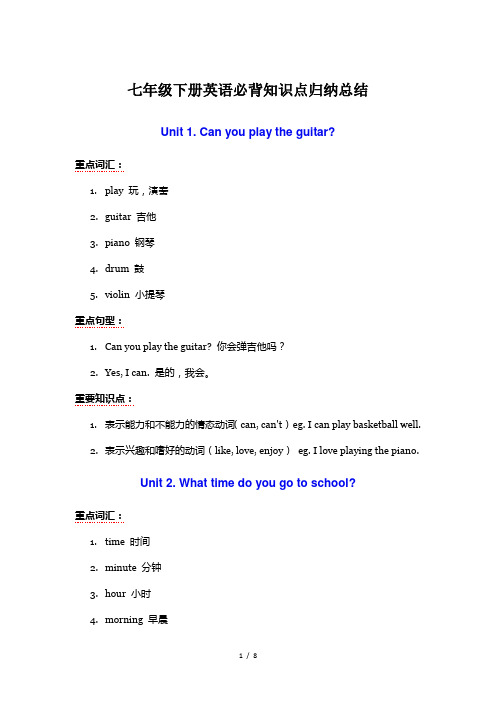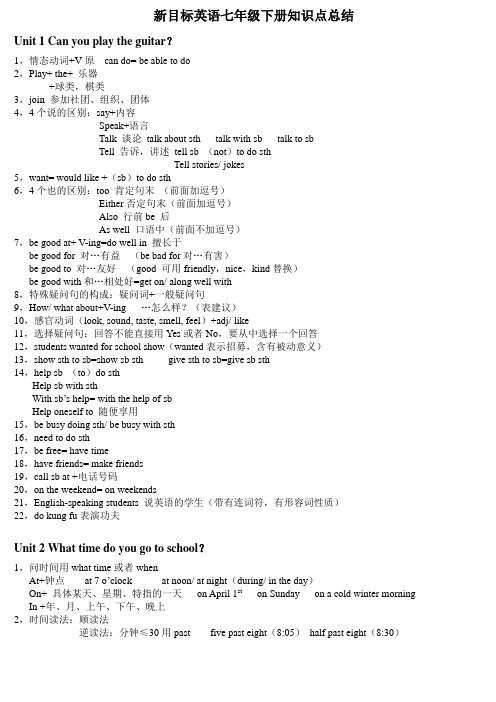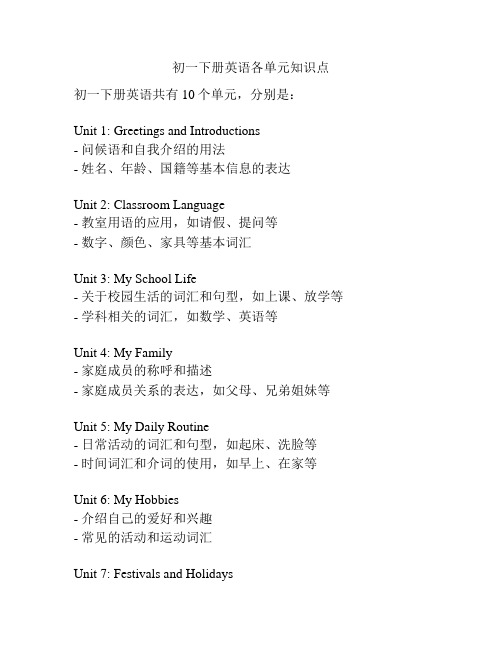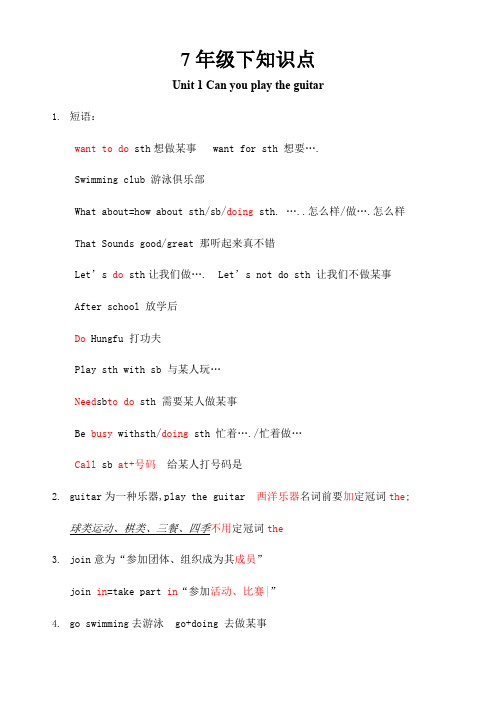7下英语知识点
七年级下册英语必背知识点

七年级下册英语必背知识点归纳总结Unit 1. Can you play the guitar?重点词汇:1.play 玩,演奏2.guitar 吉他3.piano 钢琴4.drum 鼓5.violin 小提琴重点句型:1.Can you play the guitar? 你会弹吉他吗?2.Yes, I can. 是的,我会。
重要知识点:1.表示能力和不能力的情态动词(can, can't)eg. I can play basketball well.2.表示兴趣和嗜好的动词(like, love, enjoy)eg. I love playing the piano.Unit 2. What time do you go to school?重点词汇:1.time 时间2.minute 分钟3.hour 小时4.morning 早晨5.afternoon 下午6.evening 晚上重点句型:1.What time do you get up? 你几点起床?2.I usually go to school at 7:30. 我通常七点半去上学。
重要知识点:1.表示时间的问答方式和用法eg. What time is it now? It's half past eight.2.表示日常生活习惯的一般现在时eg. I usually do my homework afterschool.Unit 3. How do you get to school?重点词汇:1.bike 自行车2.walk 步行3.bus 公交车4.subway 地铁5.taxi 出租车重点句型:1.How do you get to school? 你怎么去上学?2.I usually take the bus. 我通常坐公交车。
重要知识点:1.表示交通工具的名词和用法eg. I ride a bike to school every day.2.表示方式的副词和表达方式eg. He walks to work every morning.Unit 4. Don’t eat in class.重点词汇:1.don't do sth. 不要做某事2.eat 吃3.drink 喝4.talk 谈话5.listen 听6.music 音乐重点句型:1.Don't talk in class. 上课时不要讲话。
七年级下册英语知识点复习(完整版)

新目标英语七年级下册知识点总结Unit 1 Can you play the guitar?1,情态动词+V原can do= be able to do2,Play+ the+ 乐器+球类,棋类3,join 参加社团、组织、团体4,4个说的区别:say+内容Speak+语言Talk 谈论talk about sth talk with sb talk to sbTell 告诉,讲述tell sb (not)to do sthTell stories/ jokes5,want= would like +(sb)to do sth6,4个也的区别:too 肯定句末(前面加逗号)Either否定句末(前面加逗号)Also 行前be 后As well 口语中(前面不加逗号)7,be good at+ V-ing=do well in 擅长于be good for 对…有益(be bad for对…有害)be good to 对…友好(good 可用friendly,nice,kind替换)be good with和…相处好=get on/ along well with8,特殊疑问句的构成:疑问词+一般疑问句9,How/ what about+V-ing …怎么样?(表建议)10,感官动词(look, sound, taste, smell, feel)+adj/ like11,选择疑问句:回答不能直接用Yes或者No,要从中选择一个回答12,students wanted for school show(wanted表示招募,含有被动意义)13,show sth to sb=show sb sth give sth to sb=give sb sth14,help sb (to)do sthHelp sb with sthWith sb’s help= with the help of sbHelp oneself to 随便享用15,be busy doing sth/ be busy with sth16,need to do sth17,be free= have time18,have friends= make friends19,call sb at +电话号码20,on the weekend= on weekends21,English-speaking students 说英语的学生(带有连词符,有形容词性质)22,do kung fu表演功夫Unit 2 What time do you go to school?1,问时间用what time或者whenAt+钟点at 7 o’clock at noon/ at night(during/ in the day)On+ 具体某天、星期、特指的一天on April 1st on Sunday on a cold winter morning In +年、月、上午、下午、晚上2,时间读法:顺读法逆读法:分钟≤30用past five past eight(8:05)half past eight(8:30)分钟>30用to a quarter to ten(9:45)整点用…o’clock 7 o’clock(7:00)3,3个穿的区别:wear 表状态,接服装、手套、眼镜、香水等Put on 表动作,接服装Dress 表动作,接sb/ oneself get dressed穿衣3,感叹句:How+adj+主谓!How+adj+a/an +n单+主谓!What+ a/an +adj+ n单+主谓!What+ adj+ n复/ 不可数+主谓!4,from…to…5,be/ arrive late for6,频度副词(行前be 后)Always usually often sometimes seldom hardly never7,一段时间前面要用介词for for half an hour for five minutes8,eat/ have…for breakfast/ lunch/ dinner/ supper9,either…or10,a lot of=lots of11,it is +adj+for sb +to do sth (adj修饰to do sth)It is important for me to learn English.it is +adj+of sb +to do sth (adj修饰sb)It is kind/ friendly/ nice of you to help me.Unit 3 How do you get to school?1,疑问词How 如何(方式)how long 多长(时间)答语常用“(For/ about +)时间段”how far多远(距离)答语常用“(It’s +)数词 +miles/ meters/ kilometers”how often多久一次(频率)答语常用“Always/ often/ every day/…”或“次数+时间”等表频率的状语How soon多快,多久以后,常用在将来时中。
初一下册英语各单元知识点

初一下册英语各单元知识点初一下册英语共有10个单元,分别是:
Unit 1: Greetings and Introductions
- 问候语和自我介绍的用法
- 姓名、年龄、国籍等基本信息的表达
Unit 2: Classroom Language
- 教室用语的应用,如请假、提问等
- 数字、颜色、家具等基本词汇
Unit 3: My School Life
- 关于校园生活的词汇和句型,如上课、放学等- 学科相关的词汇,如数学、英语等
Unit 4: My Family
- 家庭成员的称呼和描述
- 家庭成员关系的表达,如父母、兄弟姐妹等
Unit 5: My Daily Routine
- 日常活动的词汇和句型,如起床、洗脸等
- 时间词汇和介词的使用,如早上、在家等
Unit 6: My Hobbies
- 介绍自己的爱好和兴趣
- 常见的活动和运动词汇
Unit 7: Festivals and Holidays
- 介绍常见的节日和假期
- 相关的庆祝活动和特色食物等
Unit 8: My City
- 城市相关的地理和建筑物词汇- 指示方向和交通方式的表达
Unit 9: At the Restaurant
- 在餐厅用餐的基本用语和礼仪- 常见的食物和饮料词汇
Unit 10: Shopping
- 购物场景下的问询和购买方式- 常见商品和货币的表达。
七年级下英语知识点大全

七年级下英语知识点大全七年级下英语是中学英语学习的基础阶段,对学生掌握英语基本语法、词汇、语音、语调等方面起到关键作用。
本文将从以下几个方面为大家梳理七年级下英语的知识点大全。
一、语法1. 一般现在时和一般过去时的构成和用法;2. 肯定形式、否定形式、疑问形式和回答形式的句型构成;3. 简单句和复合句的区别和构成;4. 祈使句、感叹句、陈述句以及疑问句的用法和句型构成;5. 含有情态动词的句子的构成和用法。
二、词汇1. 基本词汇:数字、颜色、天气、家庭、职业、饮食、交通、娱乐、身体各部位、时间等;2. 动词的一般现在时和一般过去时的时态变化和用法;3. 常用介词、副词、形容词、代词、连词等的用法;4. 重点词汇:名词、动词、形容词、副词等的辨析;5. 常用短语和惯用语的用法和意义。
三、语音1. 英语元音、辅音的发音方法及发音区别;2. 重音、轻音的区别及在不同单词中的应用;3. 连读、缩读、语调等基本语音技巧的运用。
四、阅读1. 了解文章结构和主旨;2. 阅读理解的基本方法和技巧;3. 文章中的重点句型和重点词汇;4. 不同类型文章的写作风格和特点。
五、写作1. 熟悉英语的基本句型;2. 如何遣词造句地表达自己的观点;3. 写作技巧和写作准则;4. 书信格式、邮件格式、短文格式等不同类型写作的特点和要求。
六、听说1. 听力技巧和训练方法;2. 默写、听音辨词、听音辨意训练;3. 听力材料的种类和来源;4. 口语练习、语音训练等讲练结合的技巧。
以上就是七年级下英语知识点大全,每个知识点都是相互关联的,只有融会贯通,才能在英语学习中更快地进步。
在学习过程中,一定要注重日积月累,努力掌握基础知识,打牢英语学习的基础。
七下英语语法知识点归纳总结

七下英语语法知识点归纳总结以下是七下英语的部分语法知识点:1. 现在进行时定义:表示正在进行的动作或存在的状态。
结构:be (am/is/are) + 动词的现在分词。
动词现在分词形式:动词+ing,例如:playing, singing, 写作:writing。
用法:描述真实情境中的动作,例如“他正在看书”。
2. 动词不定式定义:动词不定式是非谓语动词的一种形式,表示不定或未来的动作。
结构:to + 动词原形,例如:to play, to go。
用法:作为目的状语、作为后置定语等。
3. 形容词的比较级和最高级定义:形容词的比较级表示“更……”,最高级表示“最……”。
结构:比较级:形容词+er,最高级:形容词+est。
用法:描述物品的大小、重量、长度等属性的比较,例如“这个苹果比那个大”。
4. 情态动词定义:情态动词是一种表示可能性、必要性的助动词。
结构:can, could, may, might, must等。
用法:表示可能性,例如“他可能在这儿”;表示必要性,例如“你必须快点儿”。
5. 一般将来时定义:表示未来的动作或状态。
结构:will + 动词原形,例如:will go, will be。
用法:描述未来的计划、安排等,例如“明天我将要去公园”。
6. 一般现在时定义:表示现在的动作或状态。
结构:动词原形,第三人称单数形式为动词+s/es。
用法:描述日常习惯、事实等,例如“我每天早上跑步”。
7. 现在完成时定义:表示过去的动作对现在的影响或过去的动作持续到现在。
结构:have/has + 过去分词。
用法:描述已经完成的动作或状态,例如“我已经完成了作业”。
8. 时间介词和连词表示时间的介词:at, on, in;before, after;since等。
表示时间的连词:when, while等。
用法:描述时间关系,例如“我在上学的时候去了北京”。
9. 宾语从句和定语从句宾语从句:放在动词或介词后面的句子,充当宾语。
初一下册英语重点知识点归纳

初一下册英语重点知识点归纳初一下册英语重点知识点归纳在我们的学习时代,很多人都经常追着老师们要知识点吧,知识点就是掌握某个问题/知识的学习要点。
掌握知识点是我们提高成绩的关键!以下是店铺帮大家整理的初一下册英语重点知识点归纳,希望对大家有所帮助。
初一下册英语重点知识点归纳篇1一、look for/ findlook for 意为"寻找",而find意为"找到,发现",前者强调"找"这一动作,并不注重"找"的结果,而后者则强调"找"的结果。
例如:She can't find her ruler. 她找不到她的尺子啦。
Tom is looking for his watch,but he can't find it.汤姆正在寻找他的手表,但没能找到。
二、 be sleeping/ be asleepbe sleeping 表示动作,意思是"正在睡觉";be asleep 表示状态,意思是"睡着了"。
如:---What are the children doing in the room? 孩子们在房间里做什么?---They are sleeping.他们正在睡觉。
The children are asleep now.现在孩子们睡着了。
三、 often/ usually/sometimesoften表示"经常",sometimes表示"有时候",在表示发生频率上often要高于usually,usually要高于sometimes。
这三个词表示的是经常性,一般性的动作或情况,常与一般现在时连用,常位于主要谓语动词的前面,其他谓语动词(be动词,情态动词和助动词)的后面,有时也可位于句尾。
如果要加强语气,则放在句首。
七年级下册英语Unit知识点

人教版七年级下册英语U n i t知识点文稿归稿存档编号:[KKUY-KKIO69-OTM243-OLUI129-G00I-FDQS58-Unit9名词:height 身高;高度cinema 电影院glasses 眼镜actor 演员actress 女演员person 人nose 鼻子mouth 嘴face 脸eye 眼睛singer 歌手artist 艺术家way 方式;路线end 结尾;尽头动词:may 也许;可能;可以put 放describe 描述形容词:straight 直的curly 卷曲的tall 高的thin 瘦的heavy 重的little 小的medium 中等的handsome 英俊的round 圆形的real 真正的;真实的副词:later 以后differently 不同地兼类词:tonight adv&n(在)今晚;(在)今夜each adj&pron 每个;各自another adj&pron 另一;又一短语:(be)of medium height 中等身高a little 一点;少量look like 看起来像first of all 首先in the end 最后知识点:1、tall 高的反义词 short 矮的,常指人、动物、树、建筑物等很高a tall tree 一棵高高的树a tall building 一栋高楼high 高的反义词 low 低的,多指山高,也指空间位置或程度高,还可以指价格、速度、温度等a high mountain 一座高山high price 价格高2、medium 中等的be of medium height 中等身高be of medium build 中等身材My uncle is of medium height. 我叔叔中等身高。
区分:middle 中间的;中部的There is a tree in the middle of his yard. 他的院子中央有一棵树。
七年级英语下册单元知识点总结

7年级下知识点Unit 1 Can you play the guitar1.短语:want to do sth想做某事 want for sth 想要….Swimming club 游泳俱乐部What about=how about sth/sb/doing sth. …..怎么样/做….怎么样 That Sounds good/great 那听起来真不错Let’s do sth让我们做…. Let’s not do sth 让我们不做某事After school 放学后Do Hungfu 打功夫Play sth with sb 与某人玩…Need sb to do sth 需要某人做某事Be busy withsth/doing sth 忙着…./忙着做…Call sb at+号码给某人打号码是2.guitar为一种乐器,play the guitar 西洋乐器名词前要加定冠词the;球类运动、棋类、三餐、四季不用定冠词the3.join意为“参加团体、组织成为其成员”join in=take part in“参加活动、比赛|”4.go swimming去游泳go+doing 去做某事5.注意区分:speak, say, talk和tella)①say说话 What can you sayb)②speak+语言c)③talk表示两个人或多个人在一起讲话、谈论多指随意谈论talk with sb与某人交谈 talk to sb 向某人说… talk about谈论…;d)④tell的意思是“告诉,讲述,吩咐”,讲故事或讲笑话多用tell;6.Show “表演,演出,出示……给某人看”, show sth. to sb.=show sb. sth.;7.show作名词,意为“展览,展出”on show “在展出” car show 车展;school show 学校公演fashion show 时装表演;a flower show花展8.help sth. 在……方面帮助某人help sth.帮助某人….. help sth.帮助某人干什么;a)I often help him do his homework.b)I often help him his homework.9.be good with... 与……相处得好;与……合得来=get on well withbe good at doing sth擅长做某事 be good for对……有益处;be good to sb 对某人好10.Can you play the guitar你能弹吉他吗情态动词:不能单独做谓语动词;无人称、单复数变化;后接动词原形1.表示能力能;会;如:He can speak English.他会说英语;2.表示许可,意为“可以”,这时可以和may通用,但是比may较正式;如:Can I use your pen我可以用你的钢笔吗3.表示可能性,意为“可能”,这时常出现在否定句中;如:It can’t be true.这不可能是真的;4.表示提供帮助;如:Can you help me你可以帮助我吗1.肯定句:主语+can+动词原形+其他;如:2.否定句:主语+can’t+动词原形+其他;如:3.一般疑问句:Can+主语+动词原形+其他肯定答语:Yes,主语+can.否定答语:No,主语+can’t.如:4.特殊疑问句:疑问词+can+主语+动词原形+其他如:What can I do for you我能为你做点什么呢Unit 2 What time do you go to school1.重点短语:get up 起床 get dressed 穿衣服 get on上车 get off 下车get home到达家中get to work到达工作岗位practice guitar 练吉它 practice doing sth练习做…leave home 离家take a shower = have a shower 洗淋浴澡have/eat breakfast/dinner/lunch 吃早、晚、午饭go to bed 睡觉反义词get upput on 穿衣服反义词take offdo one’s homework 做家庭作业tell sb. about sth. 告诉某人某事love to do = like to do 喜欢干某事 like doing sth at around/about six o’clock 六点左右in the morning/afternoon/evening 在早上/下午/晚上listen to 听…on weekends=at the weekend 在周末on school days 在学校上课日late for… …. 迟到了lots of =a lot of 许多a good /bad habit 好习惯take a walk=have a walk 散步live a happy life 过着幸福的生活2英语时间的表达What is the time 几点了It’s….1直接法:6:10 →six-ten 8:50→eight-fifty6:00 →six o’clocko’clock可省2借助介词to/past分钟数+to/past+小时小于等于30分钟“past” 超过10:15→ a quarter past ten或fifteen past ten 9:30→half past nine或thirty past nine大于30分钟“to”差….到….翻译时要注意时钟要加111:50→ten to twelve9:45→a quarter to ten或fifteen to ten3 what time与when的区别what time “几点”问的是具体的时间,回答要具体到小时;What time do you go to school你什么时候/几点上学when提问,回答既可以是具体的时间,也可以是不具体的时间,如:in the morning,last year,in 1998等范围大的时间;例如:When does he take a shower他什么时候洗澡He takes a shower in the morning.他在早上洗澡;也可用具体时间:I take a shower at 6 o’clock in the morning.我早上六点洗澡;3、 listen to, hear和sound△listen to意为“注意听”,表示有意识地去听,但不一定听得见什么,强调听的动作;They are listening to the teacher. 他们在听老师说;△hear意为“听见”,强调听的结果;如:I’m sorry to hear that.听到那个消息我很难过;△sound意为“听起来,听上去”,可作系动词+形容词The music sounds sweet. 这音乐听起来悦耳;Unit 3 How do you get to school1、重点短语搭配take the subway 乘地铁every day 每天think of 认为 think about 考虑between…and….在…和…之间 next to在旁边come true 实现I think so 我也这样认为I don’t think so 我不这样认为It’s easy /difficult for sb to do sth 对某人而言做什么是很容易/困难的it is easy to get to school到达学校很容易on a ropeway 坐缆索cross the river 穿过河流one 11-year-old boy 一个11岁的男孩红色部分为一个形容词I’m 11years old 我11岁quickly 动作上快 fast 速度上快 soon时间上快the river runs quickly 河水流的快ten minutes’ walk / a ten-minute walk =10 minutes on foot 10分钟的路be afraid to do/ be afraid of sth / doing害怕做某事why not +v原形 == why don’t you +v原形为什么不...........how to do it 怎么来做它what to do 做什么what do you think of =how do you like你觉得怎么样how long does it take sb to do sth花费某人多长时间做某事crossing the river is… 穿过河是…ing型动词做主语谓语动词用单数2、How do you get to school你怎样到达学校交通方式的表达:1 take/ride/drive + a/the +交通工具take a bus/car…2by +交通工具 by bus/car3on/in + a/the +交通工具in:封闭/半封闭/小型工具;on:大型4ride/fly/drive to +交通工具= go to +地点+by+交通工具walk to+地点= go to+地点on foot.eg: I drive to school every day.= I go to school by carI walk to school every day.= I go to school on foot3、spend, cost, pay 与 take区别(1)spendsb spend…on sth或spend…in doing sth.意为“某人花时间/金钱做某事”;eg: I spent 5 dollars on the book.=I spend 5 dollars buying the book.(2)coststh cost sb some money意为“某物花费某人多少钱”;eg: The skirt costs her 200 yuan.(3)paysb pay money for sth.意为“某人为某物付款”;eg: He paid 1000 yuan for the TV set.(4)takeIt takes sb time/ money to do sth.eg: It took him seven days to make the big cake.4、Then the early bus takes him to school.take…to…意为“把…带去…” bring….to….把…带来….5、how far用来提问距离,意为“多远;How far is it from A to B=How far is B from A A 到B有多远①用长度单位表示eg: —— How far is it from your home to the bus stop ——It’s five kilometers.②用时间表示eg: —— How far is the park from the shop——It’s ten minutes’ walk.6、how long 用来提问时间,意为“多久”;eg: —— How long have you been in America—— For two years. for+短时间表示“长达…”7、say, speak, talk与tell8、look, read, see与watch9、there be 句型就近原则There is no bridge=there is not a bride 这儿没有桥◆unit 4 Don’t eat in class.1、重点短语与句型on time准时 in time 及时fight for 为….而斗 fight against 为反对….而战斗 fight with 与…一起战斗go outsider 去外面It’s important for sb to do sth 对…人而言做…是很重要的practice sth/ doing sth 练习…/练习做…do the dishes 清洗餐具make bed 铺床be strict with sb 对某人严格remember/forget to do sth 记得/忘记要做…remember/forget doing sth 记得/忘记做过…follow the rules 遵守规则learn from sb/sth 从…..学习 learn to do sth 学会做某事be late for school 上学迟到have to 不得不don’t have to=needn’t 不必 must 的一般疑问句否定回答school uniform 校服on school nighs 在上学日的晚上too much+不可数名词“太多” too many +可数名词的复数“太多”much too + 形容词/副词“太….”in the kitchen 在厨房let/make/have sb do sth 让某人做某事good luck 好运keep+形容词保持… keep quiet 保持安静=be quietkeepsb doing sth 一直做某事 He keeps me waiting for him a long time. 他让我等了他很久keep sb from doing sth 阻止某人做某事have fun doing sth 很高兴做某事。
- 1、下载文档前请自行甄别文档内容的完整性,平台不提供额外的编辑、内容补充、找答案等附加服务。
- 2、"仅部分预览"的文档,不可在线预览部分如存在完整性等问题,可反馈申请退款(可完整预览的文档不适用该条件!)。
- 3、如文档侵犯您的权益,请联系客服反馈,我们会尽快为您处理(人工客服工作时间:9:00-18:30)。
7下英语知识点
姓名:班级:
几组近义词:
一、speak/say/tell/talk(说)
eg:1.I can_____English. 2.Hello! Can I _______ to Tom?
1.Our teacher often _______” Don’t swim in the river alone.”
2.I want to _______ with you.
3.Let’s _______ about the wether.
4.Can you _______me a story?
5.He ______ us to arrive at school on time.
二、take/spend/pay/cost(花)
1.花某人一些时间做某事:
2.某人花一些时间做某事:
3.某人花一些钱在某物上:
4.某人为某物花一些钱:
5.某物花某人一些钱:
三、Also/too/either(也)
肯定句子中用:肯定句尾用:否定句尾用:
1.I’m ten years old. He is____ ten years old.
2.I’m ten years old. He is ten years old,________.
3.I’m not ten years old. He isn’t ten years old,_________.
四、some/any.
1.There is_______water in the glass.
2.There isn’t_______water in the glass.
3.Is there _______water in the glass?
4.Would you like ______noodles?
5.How about _______flowers?
五、Still与yet
1.I am ________hungry.
2.I am not sure_________.
六、Interesting与interested
1.The story is ___________
2.I am _________in soccer.
3.She is _________in the __________book.
类同词:bored/ boring,excited/exciting,relaxed/relaxing,
Surprised/surprising
七、Shout at与shout to
八、Question 与problem
九、Other 与else
1.What ______can you see in the picture?
2.What _______animals can you see in the picture?
3.I have two sisters. One lives in Yibin ,_________lives in Beijing.
4.There are some people in the park.Some are taking a walk,______ are talking
happily.
5.We should help each_______.
6.I don’t like this pen ,Can you show me __________ one.
十、arrive/get to
1.when are you ____________?
2.Don’t _______________school late.
3.How do you _________there?
十二、形容词和副词的区别。
1.we usually have a________lunch.
=we usually have lunch _______.(quick/quickly)
2.The food taste ______. He eats_______
This is a ______book. The play the piano______
This book is ___________(good/well)
3.The rain is ________.It is raining ___________(heavy/heavily)
4.This is a __________story.This story is_____intersting
He runs ________quickly. The house is________
I ________want to work in Shanghai .(real/really)
十三、In /on/at
______six o’clock _______half past seven
______the morning ________Sunday morning
_______the morning of the Children’s Day
________June ______June 1st
______May,2010 _______May 20th,2012
十四、the number of/a number of
十五、wear/put on/ dress
十六、the second language/a second language
十七、a little/little/a few/few
十八、may/maybe
1.He _______ be at home. He____know your name.
2.______he is at home. ______he know s your name
2.擅长(某事/做某事):
3.因做某事而感谢某人:
4.做某事怎么样?
5.考虑做某事:
6.对做某事感兴趣:
7.告诉某人(不要)去做某事:
8.帮助某人做某事:
9.教某人做某事:
10.停止做某事:
11.停下来去做某事:
12.阻止某人做某事:
13.记住去做某事:
14.记得做过某事:
15.忘记去做某事:
16.忘记做过某事:
17.看见某人在做某事:
18.看见某人做某事:
19.听见某人在做某事:
20.听见某人做某事:
21.开始做某事:
22.害怕做某事:
23.需要做某事:
24.想要做某事:
25.希望做某事:
26.学做某事:
27.做完某事(完成做某事):
28.练习做某事:
29.喜欢做某事:
30.保持做某事:
31.错过做某事:
32.某人花时间做某事:
33.花某人一些时间去做某事:
34.很高兴做某事
35.不得不做某事
短语过关:
1.下棋弹吉他
加入讲故事俱乐部
讲英语和某人交谈和……相处的好:对…..有好处:
写信给某人:给某人看某物:和….交朋友:在某方面帮助某人:在周末:起床:
穿上衣服:刷牙:
洗澡:在晚上:
做作业:散步:
去散步:要么…要么…..
许多:乘坐公交车:在….和…之间:实现:
清洗餐具:整理床铺:
不要吵闹:安静:
对(某人)要求严格:
遵守规则:来自于:
稍微,有点儿: 对…. 友好
迷路:是…的象征:
处于(极大)危险中:
捎个口信:给….回电话:
堆雪人:去游泳/滑冰/购物/钓鱼:在….对面:沿着…走
在…..前面:向左/右转:
在左边:在第一个路口左转:彼此:最后:
首先:三天后:
愿意,想要:点菜:
一大碗:世界各地:
许愿:吹灭:
受欢迎:给…….带来好运:
给奶牛挤奶:骑马:
喂鸡:在乡下:
总的来说:熬夜:
跑开:放风筝:
三天前:去年、昨晚:
搭建帐篷:把……弄醒:
跳入河中:在森林里:
捡起:不要担心:
担心某人:如此….以致于….
太…而不能…..: 在沙滩上:
缺少,缺乏:由….制成:
拍照:带领某人参观某地:
动身去:近况如何:
出来,出版,发行:怎样制作机器人:为…买某物:根本就不,一点儿也不:做某事对某人来说很重要。
带…去某地:向父母大喊求助:
去睡觉:报警:
世界各地5岁多
一个十一岁的男孩:砍到,砍伐:
切碎:喜欢阅读:
生命和好运的象征:问年龄:
问地址:
问天气:
问职业:
问外表:
问距离:
问时间长度:。
